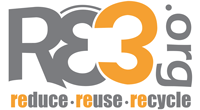Guest Blogger – Megan
Welcome to step two of social marketing! Read about Step 1 here. This blog post will focus on different strategies you can use to help promote recycling in your community. According to Fostering Sustainable Behavior, there are five tools you can use to promote behaviors: incentives, norms, prompts, commitment and communication.
Incentives can be used to entice people to want to participate in a program (everyone loves free stuff, right?). For example, someone might be more likely to bring a reusable bag to the store if they receive five cents off their purchase, as opposed to nothing. Make sure to follow these simple guidelines when you are using incentives: pair the incentive with the behavior, make it visible, consider the size of the behavior and look for non-monetary (i.e., cheap) incentives, like good PR.
There are many types of recycling incentives you can choose from, depending on the type of program you want to introduce. There are Pay-As-You-Throw programs like the one in Onslow County, non-monetary incentives like good PR, recycling reward programs like Raleigh’s Recycle and Win program with Coca-Cola, and national incentive programs such as RecycleBank.
The second tool uses norms to promote recycling. Norms can almost be thought of as peer-pressure. For example, if you see your friend recycle their plastic bottle, you probably would, too. Block leaders demonstrating the desired behavior (the norm) in their community or neighborhood goes a long way in promoting recycling.
The third tool, prompts, encourages and reminds people to participate in a certain behavior. When using prompts, make sure to use eye-catching visuals and make it self-explanatory. You will also want to consider locations and put them close to where the action is taking place. It is also better to have an encouraging prompt, rather than a negative one. For example, check out our new “Recycle Instead” decals that are being placed on trash bins across North Carolina!
The fourth tool you can use is commitment. This tool can be as simple as getting somebody to take a picture with a sign promising to recycle their plastic bottles or publically recognizing certain individuals or businesses through local media (Orange County has a great example of this). If someone promises to make a commitment or is recognized for their commitment, then they are more likely to keep practicing the behavior.
The fifth and final tool is just simply communication. The four previous tools also involve communication, so it is important to help your program move forward. Both oral and written communications are key when educating your community. There are several great ways to use written communication, such as brochures, decals, newsletters, posters, truck advertisements and social media outlets like Facebook, Twitter, Flickr, etc. Local governments can even contact DPPEA for help making a recycling brochure, free of cost.
Next, learn how to pilot and evaluate a project in your community!

1 comment:
way to go!! love the effort.
Post a Comment